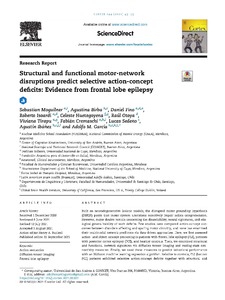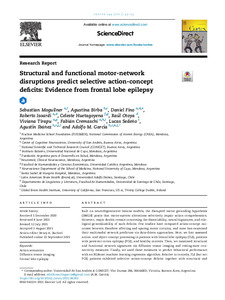Por favor, use este identificador para citar o enlazar este ítem:
https://repositorio.uca.edu.ar/handle/123456789/13411| Título: | Structural and functional motor-network disruptions predict selective action-concept deficits: Evidence from frontal lobe epilepsy | Autor: | Moguilner, Sebastian Birba, Agustina Fino, Daniel Huetagoyena, Celeste Otoya, Raúl Tirapu, Viviana Cremaschi, Fabián Sedeño, Lucas Ibáñez, Agustín García, Adolfo M. Isoardi, Roberto |
Palabras clave: | EPILEPSIA; MACHINE LEARNING; CONDUCTA; FUNCIONES MOTORAS | Fecha de publicación: | 2021 | Editorial: | Elsevier | Cita: | Moguilner, S., et al. Structural and functional motor-network disruptions predict selective action-concept deficits: Evidence from frontal lobe epilepsy [en línea]. Cortex. 2021, 144 doi:10.1016/j.cortex.2021.08.003 Disponible en: https://repositorio.uca.edu.ar/handle/123456789/13411 | Resumen: | Abstract: Built on neurodegenerative lesions models, the disrupted motor grounding hypothesis (DMGH) posits that motor-system alterations selectively impair action comprehension. However, major doubts remain concerning the dissociability, neural signatures, and etiological generalizability of such deficits. Few studies have compared action-concept outcomes between disorders affecting and sparing motor circuitry, and none has examined their multimodal network predictors via data-driven approaches. Here, we first assessed action- and object-concept processing in patients with frontal lobe epilepsy (FLE), patients with posterior cortex epilepsy (PCE), and healthy controls. Then, we examined structural and functional network signatures via diffusion tensor imaging and resting-state connectivity measures. Finally, we used these measures to predict behavioral performance with an XGBoost machine learning regression algorithm. Relative to controls, FLE (but not PCE) patients exhibited selective action-concept deficits together with structural and functional abnormalities along motor networks. The XGBoost model reached a significantly large effect size only for action-concept outcomes in FLE, mainly predicted by structural (cortico-spinal tract, anterior thalamic radiation, uncinate fasciculus) and functional (M1- parietal/supramarginal connectivity) motor networks. These results extend the DMGH, suggesting that action-concept deficits are dissociable markers of frontal/motor (relative to posterior) disruptions, directly related to the structural and functional integrity of motor networks, and traceable beyond canonical movement disorders. | URI: | https://repositorio.uca.edu.ar/handle/123456789/13411 | ISSN: | 0010-9452 | Disciplina: | PSICOLOGIA | DOI: | 10.1016/j.cortex.2021.08.003 | Derechos: | Acceso abierto. 24 meses de embargo | Fuente: | Cortex. 2021, 144 |
| Aparece en las colecciones: | Artículos |
Ficheros en este ítem:
| Fichero | Descripción | Tamaño | Formato | |
|---|---|---|---|---|
| cover.jpg | 387,49 kB | JPEG |  Visualizar/Abrir | |
| structural-funcional-motor-network.pdf | 1,28 MB | Adobe PDF |  Visualizar/Abrir |
Visualizaciones de página(s)
64
comprobado en 27-abr-2024
Descarga(s)
26
comprobado en 27-abr-2024
Google ScholarTM
Ver en Google Scholar
Altmetric
Altmetric
Este ítem está sujeto a una Licencia Creative Commons

